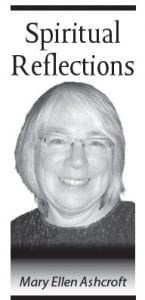“I used to be a Christian,” said Donna as we drove along the Gunflint Trail, back from a snowshoe venture. “But then I started working alongside people who were fervent Jews and Muslims…. I had a co-worker who would spread his rug to pray. And I made friends who were trying to live good lives but had been so wounded by manipulation or clergy abuse or in the church….and…”
“And?” I prompted.
“And I realized I couldn’t believe in a religion as exclusive as Christianity. How could I believe in a good and loving God who consigned all sorts of people to eternal torment? How could I believe that Jesus was the only way?”
As we drove through the twilight, I found myself thinking of the many times I’ve heard similar sentiments, especially from young persons. Often they are willing to be absolutist until around age 20—“Well, Jesus said, ‘I am the way, the truth, and the life; no one comes to the Father except by me.’ The Bible says it; I believe it; that settles it.”
Then they begin to get to know people of other faiths. Or, like Donna, they talk to friends who have been so hurt by the church’s sexism, racism, homophobia, manipulation, privilege (the list could go on!)— that they can no longer see any grace or life in Christianity. All these consigned to eternal damnation by a God who is love?
As we drove along, Donna told me that after she’d left her church she missed belonging to a faith community, so she’d tried some whose focus was on all faiths being the same. “But it seemed so vague,” she said. “All this stuff about different paths up the same mountain. They were so busy trying to be fair that there was nothing there.”
I told Donna that religious scholars have a problem with people who try to act as if all religions are essentially the same. Even though the great monotheist faiths (Islam, Judaism and Christianity) have similar roots, they have varying ideas of God, salvation, human destiny, etc. But add into the mix Buddhism, Hinduism (and others) and the idea of essential sameness becomes nonsense. Many would argue that it’s insulting: another opportunity for privileged Western intellectuals to say, “Ah yes, they’re all the same and we’re all climbing the same mountain.”
The alternative? We can treat faiths with respect, rather than diminishing them to a lowest common denominator. We can look for common themes—compassion, the Golden Rule being central. We can learn about other religions. Eboo Patel, founder of The Interfaith Student Movement, gathers different faith groups on campuses to listen to each other talk about their faith and finds it builds understanding and respect.
But we need to recognize that because faiths are different, my deeply understanding Hinduism, for example, would take a lifetime. I remembered going to hear a progressive theologian, Dorothee Soelle, speak on her book The Silent Cry: Mysticism and Resistance about the amazing heritage of Christian mystics. A woman got up at the end and recounted her dabbling in various Buddhist and Hindu mystical practices. Soelle interrupted her. “When you have exhausted the resources of your own tradition, then move on to others. Before that, it is simply imperialism.”
As we drove down the hill overlooking Lake Superior, I said, “Don’t discard your Christian faith because of your compassion for those outside the faith.” Instead, I suggested, step more deeply into your Christian faith. Find a community that supports your search for the depth and compassion of Christ. There are many, I told her, that are willing to trust to the mercy and love of God, willing to live with unanswered questions and mystery. I assured her that in my life of faith, the more I learned the more I loved and wanted to deepen my roots in Jesus.
And, I told Donna there is a long-standing tradition in Christianity, arguing that God’s love and mystery are so vast— that people getting to God is not our problem. Respected Church Fathers like Clement, Origen, Gregory of Nyssa, all believed that God’s fullness would bring all to God. Or as Dante put it, “Infinite goodness has such wide arms.”
As we turned into the driveway, Donna asked me tearfully: “Why was it hammered into me that my salvation was dependent on others being damned?” A great question, I thought. And I confess: I know how much I like to be right and see others as wrong. How tempting it is for me to be the one who is “in” while others are “out.” The church has definitely used the threat of damnation to great advantage.
What would it be like, I wondered, if Christians, instead of threatening hell, brought others to Christ by being winsome, loving and wise? What if, instead of fear, we offered a community of support, one inviting great mystery and delight, and one that held out the wide arms of God’s infinite goodness?
Each month a member of the Cook County Ministerium will offer Spiritual Reflections. This month’s contributor is Mary Ellen Ashcroft, Vicar of Spirit of the Wilderness Episcopal Church.



Loading Comments